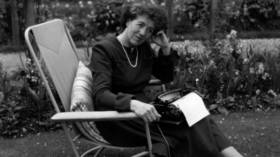‘You cannot cancel history’: UK heritage charity draws flak for updating Enid Blyton plaque bio to note ‘racism’ & ‘xenophobia’

Cultural preservation charity English Heritage has courted controversy after editing popular children’s author Enid Blyton’s biography on its website to highlight her books’ alleged “racism, xenophobia and lack of literary merit.”
As part of an audit of its blue plaque commemorative memorial scheme, the charity has added a section titled ‘Racism in Blyton’s work’ that notes some of the controversies surrounding the portrayal of non-white and non-British character in some of the author’s books both during and after her lifetime.
For instance, it notes that a publisher had rejected a manuscript for her book ‘The Mystery That Never Was’ in 1960, since it apparently displayed a “faint but unattractive touch of old-fashioned xenophobia.”
The section also added that a 1966 article in The Guardian had highlighted the “racism” of her long out-of-print book ‘The Little Black Doll’, noting that the titular character, Sambo, “is only accepted by his owner once his ‘ugly black face’ is washed ‘clean’ by rain.”
However, it mentions that “others have argued that while these charges can’t be dismissed, her work still played a vital role in encouraging a generation of children to read.”
Also on rt.com Dr. Seuss canceled: Six of author’s beloved books to cease publication over ‘hurtful & wrong’ racist imageryThe author, best known for her widely-read Noddy, Famous Five and Secret Seven series of books, has been a staple in children’s reading sections since the 1920s. Blyton has a blue plaque commemorating her former home in Chessington, where it is believed she honed her storytelling skills.
When announcing the review of their plaque scheme last year – undertaken in the wake of Black Lives Matter protests, English Heritage had pledged to include information on historical figures “whose actions are contested or seen today as negative.”
The charity’s curatorial director, Anna Eavis, said there was a “need to ensure that the actions and the legacies of those commemorated are told in full” and “without embellishment or excuses” in order to “encourage debate and reflection on the sometimes painful issues they raise.”
Also on rt.com ‘Captain Underpants’ spinoff yanked amid crackdown on supposed anti-Asian ‘passive racism’ in children’s booksBlyton, who died in 1968, wrote over 700 books and approximately 4,500 short stories. In recent years, her books – reported to have sold around 600 million copies and been translated into 90 languages – have undergone editing. For example, the ‘Golliwogs’ in her Noddy books have been changed to ‘Goblins’.
Over the past decade, Blyton has twice been rejected, in 2016 and 2019, by the Royal Mint as a candidate for commemoration on a 50 pence coin on the grounds that she was “a racist, sexist, homophobe and not a very well-regarded writer.”
However, several social media users called out the rise of “cancel culture” in “institutions [that] fail to understand you can’t judge history or historical figures by today’s standards. You cannot cancel history.”
One person noted that Blyton “should be considered a classical children’s author,” and others said her writing simply reflected the attitudes of the times.
She wrote for her time and should be considered a children’s classical author. That some ‘standards’ have changed does not diminish her prowess nor the pleasure she gave millions of well adjusted children. Shamefully today’s young kids won’t benefit as much thanks to wokes.
— Cry Havoc (@slipdogsofwar) June 17, 2021
@GBNEWS with regards to @EnglishHeritage and their wokeness on Enid Blyton, I’m so glad we didn’t renew our membership. If Enid wrote today, her writing would be different. It would reflect attitudes of today. Her writing reflected those of her time. We love her books.
— myopinion (@myopini47594043) June 17, 2021
A number of users held up the example of the financial troubles of the National Trust charity, which faced similar criticism last year for a campaign to acknowledge sites alleged to have links to colonialism and slavery, to caution English Heritage against ‘wokeness’.
Have we entered a parallel universe @GBNEWS ?Enid Blyton termed 'racist' by English Heritage.She has sold over 500,000000 books.Translated into approx 50 languages.EH need a clear out at the top similar to National Trust.Stupidity is not an asset in most business.
— Frank (@gahan_frank) June 17, 2021
Have you learned nothing from the National Trust? Enid Blyton racist and homophobic! They're children's books for God's sake, nobody had any problems with them before.Cancel culture works both ways. You cancel Blyton, we cancel our membership. Go woke, go broke.
— Gasted Flabber (@GastedFlabber1) June 17, 2021
However, a number of users claimed this was “criticism” and not an instance of cancel culture, with one person saying no one is telling opponents of the move that they’re “coming to burn your childhood.”
Her work has been criticised for these things for a long time. She can't be 'cancelled.' She's dead.Her books will still be sold, the museum won't close, the exhibits won't stop. Criticism is not being cancelled. Honestly you daily mail lot are a bunch of cry babies.
— 🅳🅾🆁🅻🅸🅽🅶 (@Dorling83) June 17, 2021
Idk how any of you are seeing g*llywog, n****r, or a doll that’s hated bc he’s black & is later “washed clean” and not seeing anything inherently racist. She was called racist at the time of writing. Acknowledge it hasn’t got it’s place now. Nobody is coming to burn ur childhood
— 𝔞𝔪𝔢𝔩𝔦𝔞 (@milkgovuk) June 17, 2021
If you like this story, share it with a friend!














